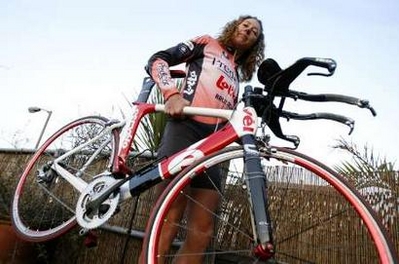Ironman world champion ignores rulebook
Updated: 2008-01-09 11:02
LONDON - Chrissie Wellington remains faintly bemused by the adulation she has received since she rewrote the triathlon rulebook by winning the Hawaii Ironman at the first attempt less than a year after turning professional.
"I still don't really know that much about triathlon," the 30-year-old Briton told Reuters in an interview, adding that she had yet to see any television highlights of the October race.
"I love the sport but I don't know much about its history and three years ago I knew virtually nothing about Ironman or Hawaii."
Hawaii knew little about her either but sat up and took notice when she destroyed the field in one of the greatest displays in the 29-year history of the iconic event which combines a 3.8-km swim, a 180-km bike ride and a marathon.
Confounding the experts and questioning the sport's received wisdom have become second nature for Wellington.
In an admission that will make most coaches feel faint, she said she had never used a heart-rate monitor, the must-have tool of every training manual. "I don't own one and I've never had a VO2 max test either," she said.
The test, routinely performed on professional athletes, measures the maximum oxygen consumption rate while exercising.
"When my coach asked me what gearing I had on my bike I didn't know what he was talking about. I won Ironman Korea with training wheels, I first climbed on a time trial-specific bike five weeks before Hawaii and a day before the race I had to fix a broken pedal with industrial glue.
"The man was right; it really isn't about the bike," she added, in reference to the title of seven-time Tour de France winner Lance Armstrong's autobiography.
CAREER BREAK
Rewind a year and Wellington was winning her age-group (amateur) world championship at Olympic distance in a performance so dominant that she decided to contemplate turning professional.
So, her career in international development with the British government was put on hold while she threw herself into the unknown and joined famed Australian coach Brett Sutton's stable in Thailand.
Opinionated and unfocused, she initially argued with Sutton on all kinds of issues, not least nutrition. Within a few weeks though, that relationship had changed into one of such trust that when he barked: "You need to eat some cheese" the previously fat-fearing Wellington merely asked: "How much?".
"He is such an individualist, that's what makes him so effective," Wellington said. "We are a group of more than 20 elite athletes with a host of personal targets and histories.
"I'm always being asked 'How many hours a week do you train? How many miles do you ride?' and the truth is I've no idea. Brett sets up a regime with particular long-term goals but he tailors things on a daily and even hourly basis depending on what he is seeing physically and mentally."
While every aspect of her life is now geared towards triathlon success, the building blocks were put in place while she was having fun during her work in Nepal, where the highlight was a 1,300-km mountain bike trek via Everest base camp that involved daily spells of up to 10 hours in the saddle.
"It was amazing," she said. "You think you are over the worst for a day then suddenly you are literally faced with another mountain to climb. I suppose it helped when it came to time on the bike competitively but at the time it was just having fun as the best way to get around a fantastic country."
NEXT STEP
Sutton saw enough of that endurance base to suggest a previously unconsidered switch to Ironman. Victory on Wellington's debut in Korea in August justified that faith and paved the way for the trip to Kona, Hawaii.
Just making it to Hawaii was the culmination of long-held ambitions for most of the field but Wellington saw it merely as the next step in an exciting adventure that could yet involve a return to Olympic distance for a tilt at Beijing in August.
"I'm driven and competitive, don't get me wrong, but Hawaii wasn't the be-all and end-all for me and that helped," she said.
She arrived at the start as a virtual unknown but was determined to defer to no-one.
Nine hours, eight minutes and 45 seconds later, she had become an Ironman immortal. She won by a big margin, her bike time was nearly five minutes faster than any other woman in the field and she closed out the event with a 2:59.58 marathon, the second fastest in race history.
For Wellington, though, the highlight of her Hawaii experience was the time she spent back at the finish line hours after she had finished, watching the amateurs limp home after up to 15 hours on the punishing volcanic rock.
"That was wonderful, to see each athlete's personal satisfaction when they crossed the line," she said. "Winning the race was fantastic but for me watching those age-groupers finish is what sport is all about."
|
|
|
||
|
||
|
|
|
|
